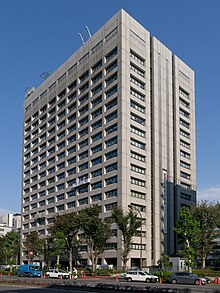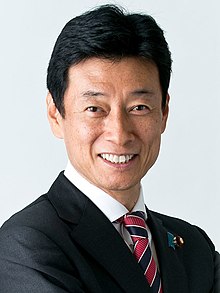The Ministry of Economy, Trade and Industry (経済産業省, Keizai-sangyō-shō), METI for short, is a ministry of the Government of Japan. It was created by the 2001 Central Government Reform when the Ministry of International Trade and Industry (MITI) merged with agencies from other ministries related to economic activities, such as the Economic Planning Agency.
| 経済産業省 Keizai-sangyō-shō | |
 | |
 Headquarters | |
| Agency overview | |
|---|---|
| Formed | 2001 (2001) |
| Preceding agencies |
|
| Jurisdiction | Government of Japan |
| Headquarters | 1-3-1 Kasumigaseki, Chiyoda-ku, Tokyo 100-8901, Japan |
| Ministers responsible |
|
| Child agencies |
|
| Website | https://www.meti.go.jp/english/ |

METI has jurisdiction over a broad policy area, containing Japan's industrial/trade policies, energy security, control of arms exports, "Cool Japan", etc.
The Ministry has its headquarters in Kasumigaseki, Chiyoda Ward, Tokyo. Its current head is Ken Saitō, who was appointed minister by Prime Minister Fumio Kishida in 14 December 2023.
The mission stipulated in Article 3 of the Act for the Establishment of the Ministry of Economy, Trade and Industry (Act No. 99 of 1999) is to "enhance the economic vitality of the private sector and develop economic and industrial development centered on the smooth development of foreign economic relations, as well as the stable and efficient development of mineral and energy resources."[3] In order to achieve the goal of ensuring supply, it has jurisdiction over macroeconomic policies, industrial policies, trade policies, trade control operations, industrial technology policies, distribution policies, and energy policies.
Some middle-ranking bureaucrats selected from the Ministry of Economy, Trade and Industry are based in the Japan External Trade Organization in foreign countries and are engaged in various research work as industrial investigators.
Since many of the industrial policies initiated by METI, such as the nuclear fuel cycle program and the 5th generation computer program and software development program ("Sigma Plan"), have failed, the ministry is not highly regarded or trusted in Japan in the 21st century.[4]
The Ministry's predecessor, the Ministry of International Trade and Industry, was in operation from 25 May 1949 to 5 January 2001. However, due to the reorganisation of central government ministries and agencies on 6 January 2001, the Ministry of Economy, Trade and Industry was established by reorganising and renaming the Ministry of International Trade and Industry.
In the past, the Ministry of International Trade and Industry was regarded as the driving force behind high economic growth as the "Economic General Staff Headquarters", the general control centre of the Japanese economy or Japan Inc.
It made full use of the licences and administrative guidance that it possessed, and was mainly in charge of industrial policy, using allocated loans (FILP) from government-affiliated financial institutions, budget allowances, and subsidies as sources of power. In addition, it held a wide range of authority in areas such as science and technology research and development, trade, patents, energy policy, and small and medium enterprise policy according to technological innovation. It was also involved in monetary policy.
However, after Japan's period of high economic growth ended, one-off policy ideas were inevitably created because, despite having a wide range of authority, they were unable to administer licensing and subsidies compared to other ministries and agencies such as "operational government agencies", it became the main one. Ad balloons for various new policies are launched around May and June every year. For this reason, while the Ministry of Finance is still a "general government agency" that is widely involved in decision-making through fiscal policy, budget assessments, and taxation, the Ministry of Economy, Trade and Industry is an "administrative department store" that has jurisdiction over most industries. It is described as a "limited general government office".
METI is organized into the following bureaus, offices, departments and 3 agencies (Agency for Natural Resources and Energy, Small and Medium Enterprise Agency, Japan Patent Office):
| # | Agency Minister | Debut month | Retire month | Prime Minister |
|---|---|---|---|---|
| 1 | Takeo Hiranuma | January 2001 | September 2003 | Jun'ichirō Koizumi |
| 2 | Shoichi Nakagawa | September 2003 | October 2005 | Jun'ichirō Koizumi |
| 3 | Toshihiro Nikai | November 2005 | September 2006 | Jun'ichirō Koizumi |
| 4 | Akira Amari | September 2006 | August 2008 | Shinzō Abe Yasuo Fukuda |
| 3 | Toshihiro Nikai | August 2008 | September 2009 | Tarō Asō |
| 5 | Masayuki Naoshima | September 2009 | September 2010 | Yukio Hatoyama Naoto Kan |
| 6 | Akihiro Ohata | September 2010 | January 2011 | Naoto Kan |
| 7 | Banri Kaieda | January 2011 | September 2011 | Naoto Kan |
| 8 | Yoshio Hachiro | September 2011 | September 2011 | Yoshihiko Noda |
| 9 | Yukio Edano | September 2011 | December 2012 | Yoshihiko Noda |
| 10 | Toshimitsu Motegi | December 2012 | September 2014 | Shinzō Abe |
| 11 | Yūko Obuchi | September 2014 | October 2014 | Shinzō Abe |
| 12 | Yōichi Miyazawa | October 2014 | October 2015 | Shinzō Abe |
| 13 | Motoo Hayashi | October 2015 | August 2016 | Shinzō Abe |
| 14 | Hiroshige Sekō | August 2016 | September 2019 | Shinzō Abe |
| 15 | Isshu Sugawara | September 2019 | October 2019 | Shinzō Abe |
| 16 | Hiroshi Kajiyama | October 2019 | October 2021 | Shinzō Abe Yoshihide Suga |
| 17 | Kōichi Hagiuda | October 2021 | August 2022 | Fumio Kishida |
| 18 | Yasutoshi Nishimura | August 2022 | Incumbent | Fumio Kishida |
In July 2019, restrictions were taken on the export of semiconductor components without any consultation with South Korea.[5][6]
35°40′19″N 139°45′04″E / 35.672°N 139.751°E / 35.672; 139.751